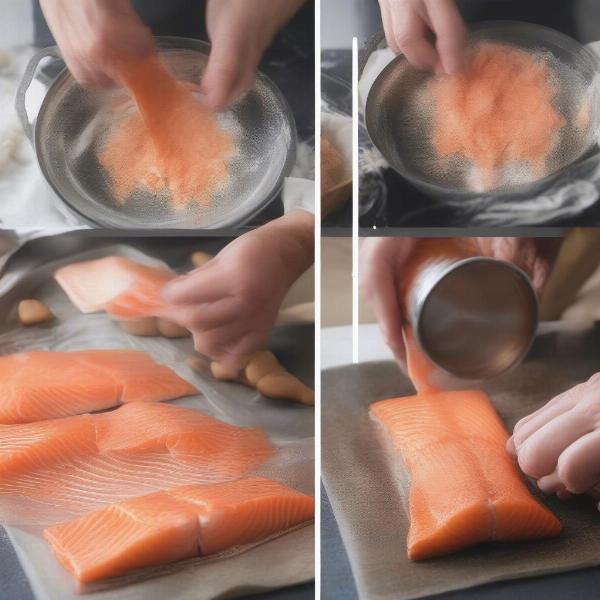Salmon skin can be a nutritious and tasty addition to your dog’s diet, offering a boost of Omega-3 fatty acids, protein, and other essential nutrients. But like any treat, it’s important to understand the benefits, risks, and best practices for feeding salmon skin to your furry friend. This article will explore everything you need to know about incorporating salmon skin into your dog’s meals safely and effectively.
The Nutritional Benefits of Salmon Skin for Dogs
Salmon skin is a rich source of Omega-3 fatty acids, specifically EPA and DHA, which are known for their anti-inflammatory properties. These fatty acids can contribute to a healthy skin and coat, reduce joint pain, and support overall cardiovascular health in dogs. In addition to Omega-3s, salmon skin provides protein, which is essential for building and repairing tissues. It also contains trace minerals like zinc and selenium, which contribute to a strong immune system.
Potential Risks of Feeding Salmon Skin to Dogs
While salmon skin offers numerous health benefits, there are some potential risks to consider. Raw salmon can contain parasites that can be harmful to dogs. Therefore, it’s crucial to ensure the salmon skin is thoroughly cooked before feeding it to your dog. Avoid giving your dog smoked or heavily salted salmon skin, as high levels of sodium can be detrimental to their health. Additionally, some dogs may have allergies to fish, so introduce salmon skin gradually and monitor for any adverse reactions.
How to Prepare and Serve Salmon Skin to Dogs
The safest way to prepare salmon skin for your dog is to bake or grill it without any added seasonings or oils. Ensure it’s cooked until crispy to minimize the risk of parasites. You can offer small pieces of salmon skin as a treat or crumble it over their regular food. Remember moderation is key – treats, including salmon skin, should make up no more than 10% of your dog’s daily caloric intake.
 Preparing Salmon Skin for Dogs
Preparing Salmon Skin for Dogs
Can Dogs Eat Salmon Skin with Bones?
Small, cooked salmon bones are generally safe for dogs to consume. They offer additional calcium and phosphorus. However, larger bones pose a choking hazard and can splinter, causing damage to your dog’s digestive tract. can dogs eat sardines with bones provides more insights into feeding fish bones to dogs.
Is Salmon Skin Good for Dogs with Allergies?
If your dog has a known fish allergy, avoid giving them salmon skin. However, if you are unsure, consult your veterinarian before introducing salmon skin into their diet. They can perform allergy testing and provide guidance based on your dog’s individual needs. salmon and sweet potato dog food might be a safer alternative for dogs with sensitive stomachs.
Conclusion
Salmon skin can be a healthy and enjoyable treat for your dog when prepared and served correctly. Its rich Omega-3 content, along with protein and essential minerals, makes it a valuable addition to a balanced diet. Always prioritize cooked salmon skin over raw, avoid excessive sodium, and monitor your dog for any signs of allergies. By following these guidelines, you can safely incorporate salmon skin into your dog’s meal plan and provide them with a delicious and nutritious reward. fish oil supplements for dogs can be a good option if you’re looking for alternative ways to supplement Omega-3s.
FAQ
- Can puppies eat salmon skin? Yes, puppies can eat cooked salmon skin in moderation, following the same guidelines as adult dogs.
- How often can I give my dog salmon skin? A few times a week as a treat is generally safe, as long as it fits within their recommended daily caloric intake.
- What should I do if my dog has an allergic reaction to salmon skin? Discontinue feeding salmon skin immediately and consult your veterinarian.
- Can I give my dog canned salmon skin? While not inherently harmful, canned salmon often contains high levels of sodium, so it’s best to stick to fresh or frozen salmon and cook it yourself.
- Is salmon skin better than other fish skins for dogs? Salmon skin is particularly beneficial due to its high Omega-3 content. Other fish skins can also be healthy but may not offer the same nutritional profile. raw poultry for dogs can be a healthy alternative protein source.
- Can I freeze cooked salmon skin for later use? Yes, you can freeze cooked salmon skin in airtight containers for up to three months.
- Are there any dog breeds that shouldn’t eat salmon skin? No specific breeds are restricted from consuming salmon skin, but individual sensitivities can vary.
ILM Dog is your trusted resource for expert advice on dog breeds, health, training, nutrition, grooming, and much more. We are dedicated to providing dog owners worldwide with reliable, practical information to ensure the well-being of their beloved companions. From puppy care to senior dog support, we offer a wealth of knowledge and resources to help you navigate every stage of your dog’s life. Contact us at [email protected] or +44 20-3965-8624. For more expert advice, visit ILM Dog today!